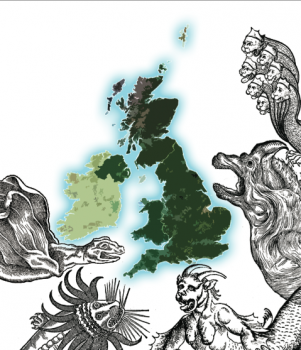
UNCHARTED TERRITORY
Britain’s possible exit from the EU has thrown international and British businesses into a state of uncertainty. How can communicators mitigate the impact on the internal audience, investors and government relations? Emily Andrews investigates
 The EU Referendum looms over the horizon. The government has confirmed that it will take place by the end of 2017, but there is still much that is uncertain. This atmosphere of uncertainty is most keenly felt by the businesses that operate in the European region. In the run-up to the referendum, and – depending on the results – during the aftermath, communicators will be called upon to help businesses reassure their stakeholders during this time of change.
The EU Referendum looms over the horizon. The government has confirmed that it will take place by the end of 2017, but there is still much that is uncertain. This atmosphere of uncertainty is most keenly felt by the businesses that operate in the European region. In the run-up to the referendum, and – depending on the results – during the aftermath, communicators will be called upon to help businesses reassure their stakeholders during this time of change.
Uncertainty is compounded by the fact that the result of the referendum is so unpredictable. Opinion polls change drastically from month to month although, as the UK general election recently showed, opinion polls are not wholly reliable. In a blog titled ‘Britain’s election makes Brexit threat real,’ posted on the Public Affairs Networking site on 8 May 2015, David O’Leary, director at Burson-Marsteller, a global communications firm headquartered in New York, and project leader of Europe Decides, said, “Even if a poll this week suggested greater popular support for membership (and falling support for a referendum). Get it wrong, and Britain could leave Europe (and a pro-EU Scotland could subsequently leave the UK).” In fact, since then, opinion polls indicate growing support for the ‘leave’ campaign.
The migrant crisis, in particular, appears to have pushed many more towards an exit vote, according to Ipsos MORI, a UK market research company. The poll results, announced in October, claimed that 52% of Britons would vote to stay in the EU, down from a record 61% in June. Support for a British exit rose to 39%, the highest level since 2012, up from 27% in June. However, perhaps most critically, over half of the British public said that they could be persuaded to change their minds on the subject. The 'stay' or 'leave' campaigns will therefore be crucial in shaping public opinion and ultimately, the outcome. In the run up to the UK general election, Fleishman-Hillard reached out to its network of clients across the EU to ask them what they thought of the possibility of a ‘Brexit,’ however, Martin Bresson, senior policy adviser at Fleishman-Hillard, a public relations and marketing agency based in Missouri, says that when that research was conducted, most thought that Brexit would not actually happen. That has changed, he says, “The sentiment among the clients we have throughout Europe is that there’s a bigger, or more apparent, realisation that this might actually happen.”
At this stage, it is not yet clear what the terms of the referendum will be, but despite this, some organisations, spurred by the possibility alone, are already speaking out. In response to Sir Mike Rake, the head of the Confederation of British Industry (CBI), who, following the UK general election in May 2015, called for employers to speak out against Britain leaving the EU, several companies came forward – including Airbus UK, Deutsche Bank and Marks & Spencer. Paul Khan, UK president of the Airbus Group, says, “If, after an exit from the European Union, economic conditions in Britain were less favourable for business than in other parts of Europe, or beyond, would Airbus reconsider future investment in the UK? Yes, absolutely.” This statement, and others like it, are likely to alarm investors, however, in expressing these kinds of sentiments, Airbus is not in the majority. Close to two-thirds of the FTSE 350 surveyed in the latest Financial Times and Institute of Chartered Secretaries and Administrators Boardroom Bellwether survey, said that a UK exit from the EU would damage their company, but only 7% said that they would speak out in favour of staying in the EU.
As the ‘stay’ and ‘leave’ campaigns get underway, their hard-hitting messages will undoubtedly have further effect upon investors and shareholders, as well as the general public. When Foreign Direct Investment [FDI] is servicing a European market from the UK, they may choose to withhold investment until after the referendum because of the uncertainty that surrounds the UK’s future as part of the EU. The Share Centre, an online share dealing company, surveyed more than 1,500 of its customers and found that 63% believed a no vote would have either no impact or a negative impact on the stock market, with 31% so worried that they had already deferred investment decisions or were planning to do so in the build-up to the referendum. Jacques de Cock, faculty member at the London School of Marketing, says, “Investor relations departments will have to counter this fear, uncertainty and doubt with realistic reassurance. This means stating that, although leaving might be a problem and will create uncertainty, the business is prepared for it, will cope and is in a position to continue growing its international business.”
The challenge for communications professionals will be to provide reassurance and guidance during this period of uncertainty. Where there is uncertainty there is risk, and businesses are, by nature, risk averse – particularly in this post-recession landscape. The EU referendum is likely to inspire an emotive debate, and therefore be divisive in the same way the Scottish independence referendum was in 2014. Companies may therefore follow the same pattern of behaviour, waiting until the last possible moment to weigh in on the issue. They are, understandably, keen to avoid taking a political stance that may result in the alienation of customers, staff or shareholders. Those that do decide to publicly join the ‘stay’ or ‘leave’ camps will rely on their public relations teams to step up and deliver that message in the best possible way; reassuring investors, employees and the public. It could be that, by establishing a firm position, companies are able to sway the outcome of the referendum, but they may also put themselves in the firing line by doing so.
 Some sectors will clearly be more affected than others, and that might affect how defined the communications strategies from companies in those sectors may be. The travel industry has seen a number of companies speak out include Airbus and Monarch Airlines. Stephen D’Alfonso, head of public affairs at the ABTA, the travel association says, “Consumers and travel businesses will be at the forefront of any Brexit impacts, as travel, by its very nature, is outward looking, with many complex links to the EU marketplace, EU transport systems, and EU regulations.”
Some sectors will clearly be more affected than others, and that might affect how defined the communications strategies from companies in those sectors may be. The travel industry has seen a number of companies speak out include Airbus and Monarch Airlines. Stephen D’Alfonso, head of public affairs at the ABTA, the travel association says, “Consumers and travel businesses will be at the forefront of any Brexit impacts, as travel, by its very nature, is outward looking, with many complex links to the EU marketplace, EU transport systems, and EU regulations.”
The vast majority of travellers travel within the EU for their holidays and the travel industry is highly regulated by Europe. However, D’Alfonso emphasises that there are still plenty of unknowns as it is still unclear how, if at all, the UK government would regulate travel in the absence of EU regulations. ABTA is currently consulting with its members around the policy areas that might be affected, however, there will be much greater clarity once prime minister David Cameron, has put his proposition to the nation. As a public affairs practitioner, D’Alfonso says, “If we weren’t in the EU, I think it would be very difficult to influence a lot of the legislation and regulation that, ultimately, many UK businesses would end up complying with anyway. Over the last two years, with the prospect of first, a referendum, and now of Brexit, it’s been a lot more difficult to ensure British voices are heard in Brussels than it was previously.”
D’Alfonso says, in the event of Brexit, it would be much harder to influence Brussels, however, it wouldn’t necessarily change much of what public affairs professionals do. In fact, he says that engaging would become even more important since there would be even more barriers to overcome. Phil Murphy, director of Public Affairs Networking, a resource for public affairs practitioners, says general uncertainty surrounding business and investment in the UK in the run-up to the referendum aside, it will be business as usual until the precise date for the vote is set. He says, “Organisations are scenario planning: leaving the EU is a massive deal, and public affairs practitioners are well-placed to help boards and executive committees see through the political and legislative issues.”
If the UK votes to leave, the extraction will take some time and will create a number of public affairs challenges where organisations will need to influence stakeholders. Between the ‘leave’ result and the ‘leave’ date, the UK would need to implement new EU rules, but it would be uncertain which rules would still apply after the UK has left. Even out of the EU, UK organisations would need to keep an eye on the rules generated by Brussels. Murphy says, “The inevitably enlarged civil service will have the task of determining the boundaries of the future relationship with the EU and individual member states, and with the rest of the world in terms of trade and other international agreements. Again, there are opportunities and the need for public affairs operatives. The industry would, by default, need to expand its range and diversity of knowledge.”
Much like the impact on consumers and stakeholders, the internal audience will be affected by the uncertainty surrounding Brexit. Should a company support either side of the debate, it runs the risk of alienating employees that feel differently. Additionally, internal communicators will have to mitigate the impact uncertainty has on the workforce. Steve Doswell, chief executive of the Institute of Internal Communications, says, “As the leader of IC’s professional body, I think internal communicators would face several aftershocks arising from the organisational, structural and economic impacts of Britain severing itself from the EU. These would certainly put our change management skills to the test. No doubt someone else might see all this in terms of renewal and fresh opportunity. I’m as ready to embrace the new as anyone, but leaving the EU strikes me as the most irresponsibly retrograde step I can imagine any government taking, short of going to war unnecessarily.”
Despite all of the uncertainties at this early stage, there is, generally, a feeling of optimism among communications practitioners with regards to their ability to survive, and even thrive, in this environment. Andy Pharoah, senior vice president of corporate affairs, sustainability and strategy at Wrigley (A subsidiary of Mars Inc and a US multinational with business operations in Europe), says, “Clearly there are people, in very specific jobs, for whom the referendum could mean a huge change. But I think, if one looks at it globally, political systems change all the time, governments change all the time, borders change, even countries change – while I’ve been in my current role, new countries have been created. Essentially, as a company, we sell in 180 countries, so we are very used to dealing with the consequences of changes in territory ownership, borders and political systems.”
Pharoah adds, “Generally, communicators are successful because they can adapt. We are good because we can provide an external perspective within our companies and we know how to negotiate intrinsically difficult environments.”
Ultimately, Cameron’s negotiations will be critical, but there is, as of yet, no official list of the concessions that will be requested. Nicola Bates, senior consultant at Ellwood Atfield, believes that the UK is in a strong position, she says, “Britain’s influence on the EU has actually been quite strong.” Bresson says, “As we get closer to a UK referendum, and we get, if not clear then less unclear, what the terms of condition or negotiations would be, it becomes clearer that this is not easy. Even if negotiations are to settle at some point, the uncertainty in itself is influencing the way that corporates are doing business.” It won’t be easy, but communicators are well equipped to navigate companies through this period of uncertainty.



